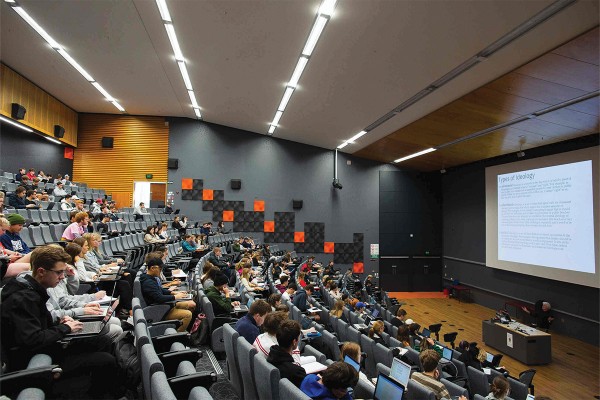It’s a tale of two papers: ECOL411 (Reading Ecology) and MARI403 (Critical Thinking for Environmental Scientists). Both papers are more similar than they may seem at first: same course coordinator, assessments and taught together at the same time, in the same room. So what’s the difference? MARI403 costs $267.89 more than ECOL411 in the big 2025 – the equivalent of 27 mint solos.
That’s a tough pill for Otago’s future overqualified dog-walkers to swallow. Critic Te Ārohi yarned with some 400-level students from each paper and Ōtākou Whakaihu Waka to figure out these twin papers (‘cause we all know there’s always a favourite twin).
Critic Te Ārohi was first made aware of the price discrepancy by OUSA’s Academic Rep, Stella Lynch, who also happens to be an ECOL411 student. 2025 domestic fees for ECOL411 are $1,535.64, while MARI403 is noticeably higher at $1,803.53. Stella explained to Critic that the papers are essentially multi-coded – except in this case, it was likely not done correctly.
Excuse the AskOtago-esque jargon. Multi-coding refers to the concept of multiple papers coming under a single code. For example, a theoretical paper shared by majors in Breatha Studies and Beezy Studies would both be under the same code: DUSTY101. This occurs when the two papers do not have enough unique content, delivery, and assessment to warrant being separate papers.
In theory, ECOL411 and MARI403 should be multi-coded. After all, students have the same content and classes together – it doesn’t make sense to code it separately. However, the fact that the papers exist under two codes (and are therefore more multi-coded) means protocols set by the University appear not to have been followed correctly.
To make matters even worse, ECOL411 and MARI403 are not restricted against each other. Theoretically, this means that a student can enrol in both papers, and have a total of 40 points count towards their degree for what is essentially the same paper (GPA booster anyone?). In all practicality, the clash due to class time would get flagged in eVision – but this is literally the only restriction. OUSA Academic Rep Stella referred to the twin papers as part of a “black market multi-code”. “The titles and prescriptions are different, the price is different, and they aren’t restricted against each other,” she explained.
When asked about this paper black market, a University of Otago spokesperson told Critic, “The University would like to thank OUSA’s Academic Representative, Stella Lynch, for raising this matter with us. We are currently investigating the situation.” No further comment from the Uni – but Stella had a lot to say. “It is an absolute violation of students’ trust in the University that this happened,” she said, and described the timing as “laughably ironic” due to the highly topical discussions regarding institutional trust, and Critic’s
recent coverage of 15-point papers.
Michelle*, a MARI403 student, was not told they would be sharing classes with 400-level Ecology students when she enrolled last year. “No, I didn't know it was a shared paper,” she told Critic. “It's listed as one we can take for Masters [...] but nothing about ECOL was mentioned. It wasn't until I checked Blackboard that I saw an ECOL code and got confused”.
As a MARI student, paying $267.89 more than ECOL students was something Michelle called “disappointing”. “We do the exact same course as the ecologists, so there’s seemingly no reason why we should pay more.” And to make matters more interesting, a quick search through the University’s website revealed that for our international tauira there’s currently no difference between the cost of papers. International fees for both ECOL411 and MARI403 in 2025 are $7454.82.
Stella’s disappointment in the University was also echoed by Michelle, who felt that “something has fallen through the cracks here,” which she described as a “common thread at the Uni”. “Their policies are great but sometimes aren't overseen on a fine scale. I’m not sure whose job it would fall under, but someone needs to be keeping a closer eye on papers to make sure this doesn't happen, whether it is a mistake or not.”
Ecology students also have some dismay at having to share class time with Marine Science students due to the nature of their course. Ecology is a teaching programme, meaning it has no “home department”. Instead, Ecology students are spread across many different departments (like Zoology, Botany, and Marine Science). This is similar to other programmes like Genetics and Neuroscience offered by the University.
Stella told Critic that the ECOL paper is called ECOL411 because it’s a 411 for Postgrad Ecology students. “We don’t have a department or a home, and this paper is as good as we’ve got. It’s more than disappointing that the primary reason for the paper has been left to the wayside,” she said.
As the University investigates how domestic students get the same education at different prices, it’s clear something has likely gone wrong behind the scenes. Spare a thought for any Ecologists who don’t wanna learn about fish in the meantime.
*Name changed.







